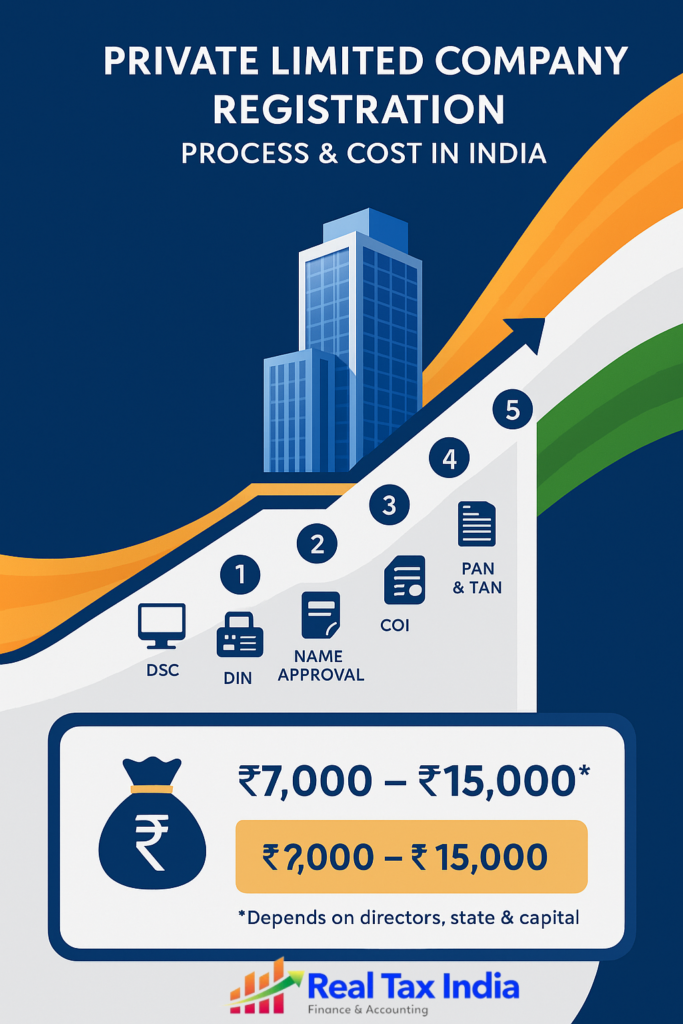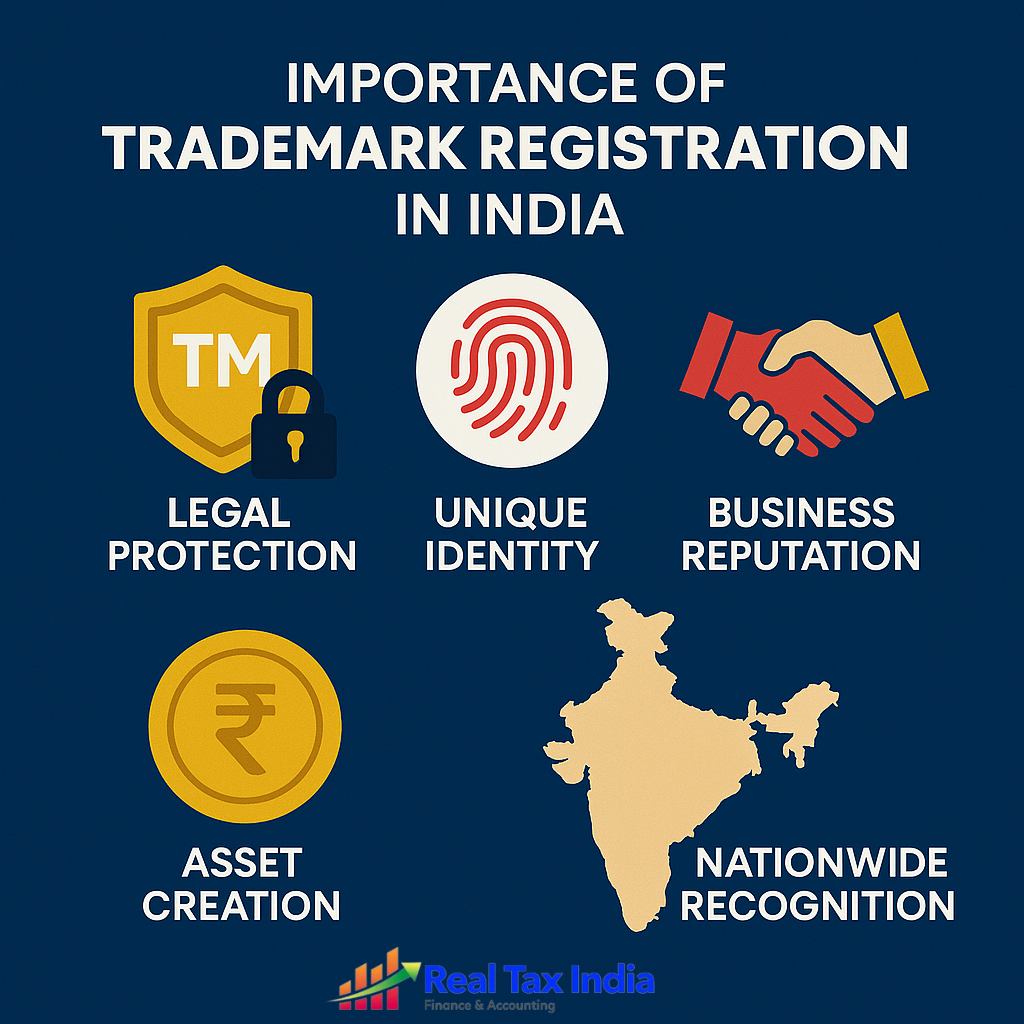Entrepreneurship is an adventurous ride, but electing the best business structure is just a start, but it’s the very first step that matters most. Private Limited Company Registration in India: What is Private Limited Company Registration in India? It’s not only legitimizing, it’s about credibility and access to funds.
If you are about to start business in India, this article will provide you with thorough knowledge of Private Limited Company Registration, advantages, eligibility criteria, list of documents required, procedure and costing.
🔹 What Is a Private Limited Company?
A Private limited company (Pvt Ltd.) is a type of privately held business entity. It is government validated that works under the Ministry of Corporate Affairs (MCA) and provides limited liability to its shareholders. This actually means that even in the event of financial loss, the owners personal monetary assets are secure.
It is the staple structure for startups due to that being what’s acceptable by investors, banks, and government agencies.
🔹 Characteristics of a Private Limited Company

✔️ Minimum 2 Directors and 2 Shareholders optional
✔️ Owners have limited liability protection
✔️ Distinct legal personality – company is considered to be a separate person from its members
✔️ Easy transfer of shares
✔️ More Credibility than proprietorships or partnership firms
🔹 Advantages of Registration of Private Limited Company

Limited Liability Protection
The shareholders are only liable for the proportion of the corporation they have invested in. Therefore Personal assets are safe.
Separate Legal Entity
It can purchase assets, contract with others and sue or be sued directly.
Easier Access to Funding
NotedRead: Why venture capitalists prefer private limited companies over proprietorship or partnership firms?
Tax Benefits
Private limited companies have several tax benefits and exemptions under the Income Tax Act.
Brand Credibility & Recognition
A Pvt Ltd Company gives professional value and trust in front of the clients, customers, and investors.
Perpetual Existence
Even as directors, or shareholders, change, the company survives.
🔹 Private Limited Company Registration Eligibility
You need to be sure of the following before registering your company:
Minimum 2 and maximum 200 participants
Minimum 2 directors (one director should be an Indian resident)
Minimum permissible capital stipulated at ₹1 lakh (no minimum paid-up capital has been prescribed)
Company name should be Original and Not Like Existing Brand names.
🔹 Documents Required for Registration of Private Limited Company

Here is a checklist of key documents you’ll need:
📌 For Directors/Shareholders:
PAN Card (mandatory if Indian)
Identity Proof (any one of Aadhar, Passport, Driving License, Voter ID)
Proof of residence (bank statement or electricity or Telephone bill)
Passport size photographs
📌 For Registered Office:
Latest utility bill (electricity/water/gas)
Rent agreement (if rented property)
NOC from the property owner
🔹 Private Limited Company Registration Step by Step Process

Here’s the short registration guide:
Step I: Digital Signature Certificate (DSC) I recently completed the above steps I-IV below.
REQUIRED FOR DIRECTORS All the directors must have DSC in order to sign electronic documents.
Step 2: User ID of the Director(Intimated) as per Form DIR-3: Type ‘DIN’.
File application for DIN for all prospective directors.
Step 3: Name Approval
Find an distinctive name for your company and obtain approval from the MCA.
Step 4: Filing The Articles About Incorporating A Company
File form SPICe+, MOA and AOA.
Step 5: Certificate of Incorporation (COI)
COI with Corporate Identification Number (CIN) is provided by MCA after obtaining all such details.
Step 6: PAN & TAN Application
Apply for company PAN and TAN as these are must for taxation.
Step 7: Opening Bank Account
We also open a bank account for your company to get you moving.
🔹Private Limited Company Registration Cost in India
Fees may change due to professional and government fees. On an average, cost cab be from ₹7,000 to ₹15,000 based on the number of directors, state of registration and authorized capital.
🔹 The Real Tax India – A Perfect Place for Company Registration in India.
Company registration can be confusing if you are new to the process. However At Real Tax India, we make it easy with:
✅ Expert guidance from professionals
✅ Hassle-free documentation process
✅ Quick turnaround time
✅ Affordable and transparent pricing
✅ Full tax, GST, and compliance capabilities from end to end
👉To learn more about it, click here: Private Limited Company Registration – Real Tax India
🔹 Conclusion
Your choice of business structure will have a major impact on your success. Protect your assets Establish credibility Attract funds Contribute to the long-term growth of your business A Private Limited Company does all of the above and more. Real Tax India will assist you online company registration with great ease, speed and best cost; to apply for new company registration only by sending simple documents.
So, if you’re considering starting up your business, don’t delay. It’s time to embark on a journey with Private Limited Company Registration in India and march ahead to fulfill your entrepreneurial dream. 🚀








 Just making money is not enough in today’s fast paced world. The true challenge is learning to make your money work for you in ways that are sustainable. Here comes the usefulness of Wealth Management and Financial Advisory Services.Here in Real Tax India, we recognize that each person has his own particular financial needs. Some dream of owning a home, others aim to pay for a child’s education, still others concentrate on saving for retirement. With the proper wealth management planning and professional financial advising, your goals can be made easier and more methodical.Why is Wealth Management Important?
Just making money is not enough in today’s fast paced world. The true challenge is learning to make your money work for you in ways that are sustainable. Here comes the usefulness of Wealth Management and Financial Advisory Services.Here in Real Tax India, we recognize that each person has his own particular financial needs. Some dream of owning a home, others aim to pay for a child’s education, still others concentrate on saving for retirement. With the proper wealth management planning and professional financial advising, your goals can be made easier and more methodical.Why is Wealth Management Important? Financial Stability: Good wealth management is about not just making your money work, but also using it in the right way that allows for a stable financial future.Goal Based Planning: Everyone has different aspirations – to own a house, to fund your children’s higher education, to buy a car or to plan a comfortable retirement. Your money is linked to those life goals in wealth managementWealth Generation — Saving is not sufficient. If you want to beat inflation and grow wealth, you have to invest money in mutual funds, SIPs and diversified portfolio 4) Diversify Your Portfolio To beat the stock market and generate the highest possible returns, the answer is to invest in a diversified list of top stocks of India – Bank FD’s or any other financial product is just not the solution.What Are Financial Advisory Services?Today, more and more professionals want to get paid to not necessarily do anything, but to make their money work for them. Here is how a Financial Advisor can assist.SIP & Mutual Fund PlanningInvesting through SIPs enable you to invest small amount every month and accumulate a huge corpus over the years.Mutual Funds also provide you investment option at varying level of risk ie., from low risk (conservative) to higher risk (aggressive) portfolios.Stock Market AdvisoryFor those who prefer to hold direct equity investments, they can recommend a portfolio construction based on risk appetite and financial objectives.Tax Planning & SavingsWith proper advice, you could save some taxes the legal way by claiming deductions or exemptions provided under the Income Tax Act.With due planning you can hold on to more of your money for investment purposes.Retirement & Insurance PlanningLong range plans that supply fixed revenue following retirement.Insurance-based products that protect your loved ones from the unknown.Robo-Advisory + Human Advisory: Best of Both the WorldsOver the past few years, with technology coming in, robo advisory services are witnessing increasing traction. These use AI and algorithms to generate automated financial plans according to your income, risk profile and goals.But even technology isn’t a complete substitute for human contact. A human adviser knows about life events, such as unexpected costs, changes in the way a client lives or the fact that a client needs to do some tax planning.👉 The first method is a combination method -it is the Automation method, robo-advisory supported with human financial advisors.How Real Tax India Helps You
Financial Stability: Good wealth management is about not just making your money work, but also using it in the right way that allows for a stable financial future.Goal Based Planning: Everyone has different aspirations – to own a house, to fund your children’s higher education, to buy a car or to plan a comfortable retirement. Your money is linked to those life goals in wealth managementWealth Generation — Saving is not sufficient. If you want to beat inflation and grow wealth, you have to invest money in mutual funds, SIPs and diversified portfolio 4) Diversify Your Portfolio To beat the stock market and generate the highest possible returns, the answer is to invest in a diversified list of top stocks of India – Bank FD’s or any other financial product is just not the solution.What Are Financial Advisory Services?Today, more and more professionals want to get paid to not necessarily do anything, but to make their money work for them. Here is how a Financial Advisor can assist.SIP & Mutual Fund PlanningInvesting through SIPs enable you to invest small amount every month and accumulate a huge corpus over the years.Mutual Funds also provide you investment option at varying level of risk ie., from low risk (conservative) to higher risk (aggressive) portfolios.Stock Market AdvisoryFor those who prefer to hold direct equity investments, they can recommend a portfolio construction based on risk appetite and financial objectives.Tax Planning & SavingsWith proper advice, you could save some taxes the legal way by claiming deductions or exemptions provided under the Income Tax Act.With due planning you can hold on to more of your money for investment purposes.Retirement & Insurance PlanningLong range plans that supply fixed revenue following retirement.Insurance-based products that protect your loved ones from the unknown.Robo-Advisory + Human Advisory: Best of Both the WorldsOver the past few years, with technology coming in, robo advisory services are witnessing increasing traction. These use AI and algorithms to generate automated financial plans according to your income, risk profile and goals.But even technology isn’t a complete substitute for human contact. A human adviser knows about life events, such as unexpected costs, changes in the way a client lives or the fact that a client needs to do some tax planning.👉 The first method is a combination method -it is the Automation method, robo-advisory supported with human financial advisors.How Real Tax India Helps You Customized wealth management and financial planning to professionals, families and businesses at Real Tax India:✅ Customized Financial Plan — Investment plans tailored to fit your income, lifestyle, and long-term objectives.✅ SIP & Mutual Fund Advisory – Grow your wealth slowly with disciplined, lower risk investments.✅ Save Tax & Comply – Legally save taxes and hassle-free filing.✅ Retirement & Insurance Planning – Picking out the right plans for secure futures.✅ Portfolio Management – Evaluating and adjusting your investment for high returns.Why Choose Real Tax India?Experienced team of financial expertsTransparent and unbiased advisoryLatest market insights and toolsClient driven philosophy – all decisions are made focused on what is most advantageous for youLong-term partnership with continuous supportConclusionPrivate wealth and advice are now a matter of necessity, not luxury. If you are a salaried individual or a businessman, whether you are in retirement phase or working professional, your financial strategy is the most essential component to achieve your life goals.At Real Tax India, we guide you through various steps to ensure that you are safe in the present and financially independent in the future.👉 Ready to turn your salary into wealth and achieve financial freedom. Contact us today!
Customized wealth management and financial planning to professionals, families and businesses at Real Tax India:✅ Customized Financial Plan — Investment plans tailored to fit your income, lifestyle, and long-term objectives.✅ SIP & Mutual Fund Advisory – Grow your wealth slowly with disciplined, lower risk investments.✅ Save Tax & Comply – Legally save taxes and hassle-free filing.✅ Retirement & Insurance Planning – Picking out the right plans for secure futures.✅ Portfolio Management – Evaluating and adjusting your investment for high returns.Why Choose Real Tax India?Experienced team of financial expertsTransparent and unbiased advisoryLatest market insights and toolsClient driven philosophy – all decisions are made focused on what is most advantageous for youLong-term partnership with continuous supportConclusionPrivate wealth and advice are now a matter of necessity, not luxury. If you are a salaried individual or a businessman, whether you are in retirement phase or working professional, your financial strategy is the most essential component to achieve your life goals.At Real Tax India, we guide you through various steps to ensure that you are safe in the present and financially independent in the future.👉 Ready to turn your salary into wealth and achieve financial freedom. Contact us today!